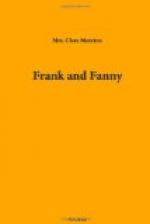CHAPTER VII.
Mary day.
Mary Day’s father was rich. He lived in an elegant house, kept a carriage and fine horses, and Mary had beautiful dresses, and a great variety of play-things.
Now I suppose you think that all these things made Mary very happy. But it was not so. Mary was a discontented little girl. She was never satisfied with any thing that she had, but was always wishing for something new. Even the flock of beautiful tame rabbits, which her father had given, afforded her but little pleasure, because she was of a discontented disposition.
[Illustration: Mary day’s rabbits.]
Now, it so happened, that Mary had been with Fanny several times to the little ‘chick-a-dee’s’ grave, and she told her mother, that she wished she had a bird’s grave of her own, like Fanny Lee’s. Her mother told her that Fanny would much rather have a live bird, like Mary’s Canary. But Mary persisted in saying, that a bird’s grave was a great deal nicer than a bird, which had to be waited on so much as her Canary did, although it was Mary’s mother who took care of her linnet.
[Illustration: Mary day’s canary.]
But Mary’s love was soon put to the test, for her Canary sickened and died; and then she found that she missed its cheerful chirrup, and the little spot where it was buried, was no source of pleasure to her, for it but served to remind her of her foolish wish.
It was about this time that their minister, Mr. Herbert, returned from a visit to New York, and he brought with him, for Fanny Lee, a beautiful bird, called a linnet.
Mr. Herbert had heard her when she spoke aloud in church, and said, “poor, dear, little birdie;” and he had inquired of Miss Norton about her, and she had told him what a good little girl she was, and how much the death of the bird had grieved her.
[Illustration: Fanny’s linnet.]
He carried the bird in a cage to Fanny, and she was so delighted, she could scarcely speak.
Mr. Herbert told her, that she need not fear that the bird would be unhappy, for it had been born in a cage, and had never been accustomed to any other kind of life. Then he told her where to put the seed, and the water, and the sugar, and how to clean the cage; and Fanny listened attentively, and thanked him so earnestly, while her dark, blue eyes sparkled with delight, that Mr. Herbert felt more than repaid for the trouble he had taken in getting the bird.
The next morning Mary Day stopped, in her way to school. When she saw the cage hanging amid the vines, and heard the clear, sweet notes of the linnet, her heart was stirred with envy. She was a very selfish little girl, or it would have pleased her to see Fanny so happy with her bird; but she looked very cross and sour, as she said,




